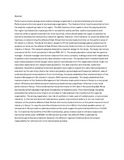| dc.description.abstract | Performance means change and proactive change is essential in a dynamic business
environment. Performance is the main goal of any business organization. The Customs
Union has the potential to form the basis for expanding trade in the region. The EAC
Customs Union assist to level the playing field for the region’s producers by imposing
uniform competition policy and law, customs procedures and external tariffs on goods
imported from third countries, which should assist the region to advance its economic
development and poverty reduction agenda. However, there has been no empirical study
that has focus on determining the effects of East African Community Customs Union on
the performance of Oil Industry in Kenya. This study therefore, sought to fill the existing
knowledge gap by answering the question on what are the effects of East African
Community Customs Union on the performance of Oil Industry in Kenya. This research
adopted descriptive research design for the study. The study carried out a census of all the
14 oil companies in Kenya (ROK, 2011). The study population comprised the general
manager, financial manager and human resource from every company making a total of
42 respondents. A questionnaire was used as primary data collection instrument. The
questionnaire included closed and open ended questions which sought views, opinion and
attitude from the respondents which might not have been captured by the closed ended
questions. The data was then summarized, coded and tabulated. Descriptive statistics
means and standard were used to analyze the data. Data presentation was done by the use
of pie charts, bar charts and graphs, percentages and frequency tables for easy of
understanding and interpretations. From the findings, the study established that
implementation of the Customs Management Act started in January 2005 has been
successful. The study established that implementation of the Customs Management Act
influence trade performance in Kenya to a very great extent. Efficiency and effectiveness
of customs procedures has a significant influence on the trade performance in Kenya.
This is evidenced by the performance of Oil trade in Kenya among East Africa
Community which has been high since introduction of Customs union. From the findings,
the study concludes that customs union lead to an increase in trade between the members
of the regional organization. The strong negotiation, low risk of conflicts in trade, pool of
market power, a harmonized reduction in internal and external trade barriers, greater
economies of scale is in turn an important indicator of the positive effects of East African
Community Customs Union on the performance of the oil industry in Kenya. To reap the
benefits of Customs Union from EAC to the fullest possible extent, oil companies in
Kenya needs to address problems that could negate the potential benefits from the EAC
CU. To maximize the benefits of the EAC membership, policy makers need to initiate
measures to harmonize tariffs under COMESA, the EAC as well as under the different
RIAs to address the shortcomings of shared jurisdiction between the different regional
initiatives since the present responsibility for enforcement is not demarcated precisely. | en |


